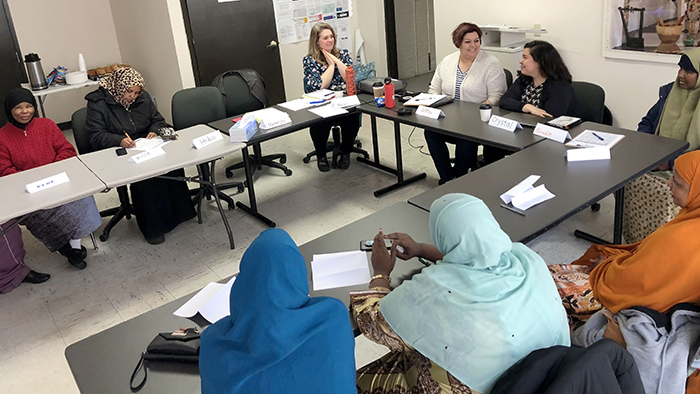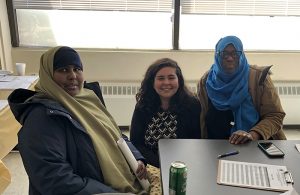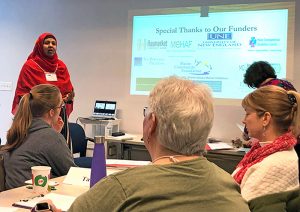
Parent Advocacy Training for Somali Parents of Children on Autism Spectrum
Over the past two decades, Maine has experienced rapid growth of racially, ethnically and linguistically diverse populations. Although Maine’s population is largely White (95%), children in Maine are disproportionately from minority populations; currently 9% of children in Maine are from a race other than White.
 Culturally and linguistically diverse parents often experience challenges in understanding the U.S. education system and the nuances of the special education system, in particular. (Pictured at right are two parents with LEND trainee Crystal Cron.) Individualized Education Program (IEP) team practices often inhibit equal collaboration of culturally diverse parents. Some immigrant parents report feeling a “lack of being a part” of the IEP process, as well as being generally disempowered by the school system. Consequently, reported outcomes included more restrictive placements for children and lack of growth on IEP goals. Additionally, parents sometimes sought less inclusive settings due to a lack of understanding of the value of inclusion across the lifespan.
Culturally and linguistically diverse parents often experience challenges in understanding the U.S. education system and the nuances of the special education system, in particular. (Pictured at right are two parents with LEND trainee Crystal Cron.) Individualized Education Program (IEP) team practices often inhibit equal collaboration of culturally diverse parents. Some immigrant parents report feeling a “lack of being a part” of the IEP process, as well as being generally disempowered by the school system. Consequently, reported outcomes included more restrictive placements for children and lack of growth on IEP goals. Additionally, parents sometimes sought less inclusive settings due to a lack of understanding of the value of inclusion across the lifespan.
In response, the University of Maine Center for Community Inclusion and Disability Studies partnered with New Mainers Public Health Initiative (NMPHI) to develop, deliver and evaluate parent advocacy training modules emphasizing Individualized Education Programs and advocacy within the K-12 system for Somali parents of children on the autism spectrum. NMPHI is a public health and social service agency headquartered in Lewiston, Maine that serves New Mainers—recent immigrants to this secondary resettlement area and their families. NMPHI’s presence as both a translator for and cultural broker with the Somali families was essential to the success of this collaboration.
 Under the guidance of leadership mentors Marnie Morneault and Hibo Omer (NMPHI), two 2018-2019 University of Maine trainees in the NH-ME LEND Program developed responsive listening sessions that used oral culture-centered strategies to capture the individual stories of parents. (Photo at right shows Hibo Omer speaking at the 2019 NH-ME LEND Spring Kickoff.) These narratives served the dual purpose of relationship building and effective data gathering and were the foundation for the training sessions. “Culturally and linguistically appropriate services are lacking in the school systems,” said LEND trainees Crystal Cron and April Fournier, “We hope to support and provide resources for community members to lead their own trainings, using their expertise about their community and their unique needs.”
Under the guidance of leadership mentors Marnie Morneault and Hibo Omer (NMPHI), two 2018-2019 University of Maine trainees in the NH-ME LEND Program developed responsive listening sessions that used oral culture-centered strategies to capture the individual stories of parents. (Photo at right shows Hibo Omer speaking at the 2019 NH-ME LEND Spring Kickoff.) These narratives served the dual purpose of relationship building and effective data gathering and were the foundation for the training sessions. “Culturally and linguistically appropriate services are lacking in the school systems,” said LEND trainees Crystal Cron and April Fournier, “We hope to support and provide resources for community members to lead their own trainings, using their expertise about their community and their unique needs.”
Funding support from a 2018 Focused Assistance to Support Training Project (FAST) grant created the opportunity to expand this new relationship between the NH-ME LEND and New Mainers Public Health Initiative to provide the following: culturally and linguistically diverse didactic content and clinical opportunities for LEND fellows; development and use of materials for NH-ME LEND seminars to provide all trainees with requisite background on Somali populations in Maine and NH; and the development and implementation of leadership placements for NH-ME LEND trainee(s) with NMPHI.
